#which says a lot because i love many ancient tragedies
Text
obsessively thinking about antigone tonight. queer antigone / antigone as a product of incest displaying incestuous undertones&themes herself / married through death antigone (anouilh’s antigone, who wanted to have her first time with hemon the evening before she goes to bury her brother, who wanted to die not-a-virgin and yet not-a-wife but who didn’t, because they fought instead) / antigone who only knows how to live for oedipus / antigone who only knows how to die for her brothers / antigone who is nothing but her love for her family / antigone who leaves ismene behind / antigone who knows her brothers have been cursed by her father but still goes back to thebes, because she has to / antigone who knows creon will remove the dirt she puts on polyneikes’ body, but still puts it there, because she has to / antigone ready to die, born to die / antigone already dead from the beginning, her fate sealed long ago / antigone leaving thebes as a child knowing she will only come back to die.
#antigone#it’s probably my favorite tragedy#which says a lot because i love many ancient tragedies#but antigone ?#i love her so much#i have so many versions of her story now#plays : sophocles (3 translations including one by anne carson) / anouilh / cocteau#novels : henry bauchau’s oedipus on the road + antigone#and it breaks me every single time#classics#oedipus#jocasta#ismene#eteokles#polyneikes#polynices
43 notes
·
View notes
Text
okay so i watched all eight episodes of 1899 in one go on monday and i cannot stop Having Thoughts. quite honestly it is the most superbly executed narrative i've ever encountered outside of literature. the sheer thematic scope and complexity is breathtaking. THEY WROTE A GREEK TRAGEDY about all my favourite things and it begins with an emily dickinson poem. !!! the universe was aiming its arrow right at my brain with this one.
(so of course it wasn't renewed. given that la révolution also wasn't renewed, i'm forced to conclude that tptb at netflix have something against thoughtful and nuanced excellence in storytelling.)
this is one of those times i especially miss metafandom because i'm sure there've been discussions about everything my brain is yelling at me but how the hell does one find the good shit anymore? or even the bad shit, for that matter. so here you go, tumblr frēonds, have yet another brain dump that nobody asked for or cares about.
a list of topics covered by 1899 that i recall after watching the entire thing once, in no particular order:
the nature of identity
the nature of reality
how grief warps both the self and the perception of reality
the often inexplicable nature of trust
the human brain's capabilities
the inherent untrustworthiness of memory and the irony that it's all we have
explorations of female identity
the many meanings of freedom
communication!! — trying to understand and be understood through barriers of language, of levels of reality, of technology
the destructive nature of religious zealotry (and christianity in general *internal sigh*)
classism
patriarchy
homophobia (both social and internalised)
the beautiful and horrific acts humans will commit in the name of love
the looming shadow of the male authority figure
space as a concept, both literal and psychological: liminal spaces, confinement
'the odyssey', obviously
the trope of the mad woman in the attic (this one gets its own post because I Have A Lot To Say)
now let's talk ancient greek references!
[1] the names of both ships come from ancient greek mythology: prometheus stole fire from the gods to give to humans and was sentenced to eternal punishment; kérberos (or cerberus) was the multi-headed dog who guarded the gates of the underworld to prevent the dead from leaving.
[2] in ancient greek philosophy, there were four classical elements; this concept was taken up in western alchemy, which made a hobby out of giving everything a glyph or symbol. the symbols of the four elements are triangles:
🜂 = fire
🜄 = water
🜁 = air
🜃 = earth
[3] it's been four months since the prometheus went missing. what, i wondered, is the significance of the number 4? in greek numerals 4 is represented as Δ´. oh, look, a triangle. and what's a triangle in three-dimensional space? a pyramid. and what's a pyramid geometrically speaking? a tetrahedron! which has 4 faces and 4 vertices. it's also the smallest possible platonic solid and plato associated it with the element fire. i don't know enough about geometry or philosophy to take these associations any further, but, as shakespeare would say, come the futtock on. this level of detail is RIDICULOUS and EVERYTHING TO ME.
#1899#1899 netflix#it's not a show it's a FIELD OF STUDY#alas metafandom we knew ye#yes i did quote upstart crow#i regret nothing
70 notes
·
View notes
Note
would love to hear from a real Greek on the subject of Katharevousa. What do you think of it? Are there some conflicting opinions between the older and younger generations on this matter? What is the general Greek opinion? is it simply viewed as an elitist ideology for purists or an inspiring dream to reinstate Ancient Greek? sincerely, a humbly curious non-Greek individual...
Hello, my friend! You bring up an interesting and very complex topic. I would say my opinion on this is less passionate, more moderate than of the average Greek and ironically this also means my opinion might seem edgy to the average Greek!
That is because a majority of Greeks loathe Katharevousa (or what they think it stands for), with older generations being more neutral whereas younger generations can express a very baffling fierce hate towards it, despite never having to study it.
The reasons for this hate are the following:
1. It is harder than Demotic and most Greeks have an allergy at whatever Greek-related presents even the slightest of additional challenge to them.
2. Its existence has been relentlessly and unfairly politicised since the early 20th century, when the historical national and then transformed into political disunity of the Greeks was channeled into many things, including painting those who were positive towards katharevousa as nationalists, fascists and extreme far rights in general.
*The second reason bleeds into the first, in some ways. Young Greeks will unironically say “why should I learn something Greek that needs a little more effort or even slightly resembles something ancient, am I a nationalist or anything?”. That is because the old Great Division of the 20s and the Civil War of the 40s were never actually fully resolved but only passed on through political tensions, and thus somewhat mollified, yet still causing significant problems in the society which are now much harder to explain and find the root cause for, so they seem to appear out of nowhere. This leads to new generations of Greeks opposed to studying properly the Greek history and Greek culture and feeling very proud of their liberal (???) choice until a conversation with a foreigner who appears to know more about them than they do embarrasses them and sometimes gives them a wake-up call. Of course, not all young Greeks are like that, but a lot are.
In any case, I am not saying I prefer Katharevousa to Demotic. I prefer Demotic for the simple reason that it is the organic evolution of the Greek language, influenced by the actual history of the Greeks rather than the history the Greeks wished they had. For this alone, it wins. What I am saying is that Katharevousa does not deserve all the fierce hate and that I would honestly not mind having it used occasionally for whatever reason, just like I wouldn’t mind using any other form of the Greek language for whatever reason. And I do not confuse various forms of the language with various political ideologies, despite others doing so. Which is very much true by the way. During the national schism, Katharevousa was accused as the symbol of royalists, nationalists and conservatives on one side whereas Demotic was accused as the symbol of communists and Venizelists from the other side. In the 20s, Greek schools would change the lingual form taught every time the power changed hands. A tragedy for the students, really.
Katharevousa was originally NOT founded on an elitist ideology but rather on a sentiment of ethnic uprising. The term for this lingual movement first appears in 1796 and thus precedes the Greek Independence from the Ottoman Empire. It was supported by many Greek scholars and influential people of the time, most of all Adamantios Korais. Katharevousa is not an attempt at reinstating Ancient Greek but an attempt of removing all the influences in the contemporary Greek language by an empire Greeks were unwilling and often rebellious subjects of. Katharevousa means exactly that, “getting purified - cleaned”, not going back. Of course, it did not only remove Turkish elements, but Latin and Slavic ones and anything else for which there was an original Greek root and was thus considered redundant. By removing the foreign loanwords from Modern Greek, you automatically bring it to a state closer to Ancient Greek without meaning that it is an actual more ancient form of the language. The Katharevousan grammar certainly tried to resist simplifications and changes taking place in Demotic Greek but it still remained an essentially Modern rather than Ancient Greek grammar. I believe the syntax was also closer to Modern. In the end, Katharevousa was like a very posh, exclusively Greek-root, old-fashioned way to speak Modern Greek.
Which is why I dislike it when the “competition” of demotic and katharevousa is often referred to as “diglossia” which means “bilingualism” or when they are even called different idioms. We are not talking about two different Greek languages here and I am quite baffled when people claim to struggle to understand katharevousa. Honestly, at this point I don’t even believe they really mean it. You see, the level of education nowadays, with all its faults, is infinitely better than what it was at the time when katharevousa was actually taught at schools. In the late 19th and early 20th centuries, most kids wouldn’t even complete elementary school and then go work to some farmland so it makes total sense for them to struggle to adjust to katharevousa when they were only really communicating in basic demotic in real life. But for people nowadays claiming the same, I can’t take them seriously, I am sorry. Such things are connected. If a student of decent education by today’s standards can’t understand katharevousa, it can only mean they face really fundamental challenges in demotic as well.
Katharevousa did not intentionally marginalize lower social classes within the society itself but the unintentional challenges were inescapable due to the poor level of education I described. In the end, Katharevousa was used by the authors and poets, in the newspapers and later the TV and radio news, in written forms, such as official documents, even in personal letters. Regardless of their level of education, people tried in written form to apply as many katharevousan elements as possible, to the extent of their knowledge. In everyday speech, though, things were different. People would simply talk in the way that came most natural and effortless to them. It’s very interesting that in very old movies, if there is a narrator, you can observe that the narrator speaks in a mild more katharevousa-like form while the actors playing the roles use demotic, obviously because otherwise the ending result wouldn’t be very realistic to the people watching. However, rich Greeks and aristocrats would more often speak in katharevousa too, exactly because they could receive much better education and get the hang of it, inevitably making this a social issue without it ever intending to be one. And then of course it had also the politics of the country imposed on it secondarily, which is a very sad and unfair equation that handicaps Greek progress in all matters.
What happened with Katharevousa and Demotic is not an unprecedented occurrence in Greek at all. This is literally Greek's constant lingual history. It can be observed in Ancient Greek, as the Classical Attic you may have read was in no way identical to the everyday language Ancient Greeks spoke. Throughout all the East Roman / Byzantine Era, scholars would try desperately to retain as many archaic elements as possible, to the growing impatience of the populace. While its full achievement was always doomed to be a lost cause, let’s also acknowledge that the reason Greeks boast about how conservative Greek is for a language so old would not exist, if all those scholars throughout the centuries did not struggle to preserve older elements, and katharevousa’s case is not different. A few of its elements have actually passed to demotic, such as phrases and expressions in the dative, even though this case has been dropped in the Demotic Greek grammar otherwise.
In the seventies, after huge political changes taking place in the country which struggled to finally enjoy some peace and quiet, katharevousa was abolished along with the monarchy and the dictatorship as another sign of nationalism, conservatism, anachronism and so on. In my opinion, a lingual form on its own does not deserve to be vilified like this.
Nowadays, you will hear just about anything as an accusation to prove how evil Katharevousa was. Some say it had “mistakes” because it was an academic process of reshaping the language against its natural, organic evolution. I would consider this, had it not been for demotic also having some funny shortcomings of its own. In case you are wondering what such a shortcoming can possibly be in a language - well, as Greek keeps evolving, some things change first while others stay behind. The elements that stay behind have trouble adjusting for practical or aesthetical or other reasons. Here is one example:

Modern Greek faces a hilarious problem with the verb εκρήγνυμαι (ekríghnime - I explode). It is a verb with a distinct archaic form which is super ugly to a violating degree if you adjust it to the modern Greek conjugation of the simple past. As a result the ancient formation of the simple past is fully retained, which is not irregular but it is hard enough that it appears irregular by modern standards (εξερράγην - exerráyin - no it’s not irregular!). As a result many people might not know it and mess it up entirely by trying to apply modern formations which will earn them mocking later if it's on TV or paper (ie εκρήχτηκα - ekríhtika - can kill you instantly if it comes from the mouth of a journalist) or you are going to see it on their face real-time that they go through the five stages of grief and seven consecutive panic attacks as they try to say “it exploded” without actually saying “it exploded”! Even more hilariously, the screenshot I added shows all the conjugations by labelling them “for scholar use” and it adds another label clarifying that only the third person of singular and plural are actually regularly used (apparently needed when speaking for bombs) and the others are avoided as much as possible. In short, we try not to use the past of a simple verb such as “explode” because we have no idea how to say it because adjusting it to modern is so monstrous that you have no solution other than keeping it entirely ancient, in a phrase otherwise entirely modern! It is actually very funny.
I said all these in order to stress how people trying to find unacceptable “flaws” in katharevousa are hypocritical because if we accept that a concept such as “flaws” is possible in a language, then it does exist in organic demotic as well. On the other hand, it also depends on the speaker. Katharevousa supporters varied in their ferocity and whereas most just kept it at the "purifying modern" object, some others tried to mix it with actual Koine or Attic Greek, undoubtedly causing lingual teratogenesis.
Some last notes: katharevousa is not entirely extinct. It is used by a newspaper, it is the language used by the Churches of Greece and Cyprus and by the Ecumenical Patriarchate of Constantinople, as it resembles more Koine (Biblical) Greek which is their actual sacred language. Some people show it off on internet comments but you can usually (not always) guess their political ideologies which is unfortunate. Ironically though, Modern Standard Greek, which is the common language we speak right now, is according to linguists considerably influenced by the katharevousa in its mixing with demotic. So, standard Greek, even though it derives from Demotic and it is technically Demotic Greek, is closer to Katharevousa than the Demotic of the 20th century is.
Another interesting point is made by Georgios Babiniotis, the currently most prominent Greek linguist. An unlikable guy if you ask me, but I can’t help but agree with this point. Although the polytonic stress system was abolished along with katharevousa with the reasoning that it served no point in Modern Greek, Babiniotis says that this was a mistake, as the monotonic system has surprisingly caused a deterioration of the musicality and correct articulation in Modern Greek. In fact, anyone who knows can go watch kids reciting poems in school and you will realise it is true. I am not putting myself out of this. Sometimes I read something loudly and I think to myself “heck in my mind this sounds so much better, why am I reciting it so poorly?!”. Even though I actually have a perfect articulation up to this stage in my life, my reciting is bland like of most people, while it wasn’t the case at all with the people in the near past. You can hear the difference when you hear actors of the 50s and actors in movies now. Both spoke in demotic, but actors of the 50s spoke much more beautifully on so many levels, including intonation and articulation. This agrees with a post I made recently unknowingly when on my own I realised that the grave accent is actually retained in modern Greek when spoken animatedly or carefully and correctly. I was almost scared to publish that post because I am no linguist but I was excited to see that the -always otherwise unlikable- Babiniotis said this too! Few liked that post - dunno if everyone hated it or it was just a huge post published at 5 am. Or both. Aaaaaanyways, I am linking it here in case anyone has reached so far down and is interested.
To summarise, Katharevousa was the victim of the insane political infighting that is such a trademark of the Greeks. It was founded on ethnical rather than elitist reasonings. It wasn’t trying to exclude anyone even though this might have indeed happened unintentionally. It is still Modern Greek. I don’t believe it should ever eradicate Demotic, however I value its existence and I think it could have a place of application and people should be free to use (within reasonable context) or enjoy it without being vilified or immediately have their political beliefs assumed. I personally find it beautiful but I also find Demotic beautiful, just in different ways. In some occasions I prefer one and in others the other. I enjoy prose and poetry in Katharevousa, it’s bloody beautiful. But use of rich and intricate demotic is also insanely wonderful. Both are great and I genuinely feel this way. I can get behind the reasoning that if a foreign loanword doesn't sound very aesthetically pleasing in the Greek language, it shouldn't be considered weird or eccentric to prefer the Greek-root word and give up on the loanword. I have used this example before, if the loanword is "dudúka", while two Greek-root words of the exact same meaning exist ("tilevóas" and "megháphono"), then why the heck would I want to use "duduka"?! No offense to the language that it comes from, but this word... I mean, come on. It doesn't sound good at all in Greek. Same with the grammar. If someone can use more intricate and complex grammar, why should we immediately blame them for doing what they can do? Come on, guys.
#greece#greek language#languages#linguistics#langblr#language stuff#modern greek#katharevousa#demotic#greek history#greek culture#anon#ask#tw long#tw long text
44 notes
·
View notes
Text
The Most Important Polycule
The one that started it all. Irena is a poor girl who has run from everywhere she's known. All that she knows about people and how to be one is from watching, and she's usually content to just bounce around wherever she does, until she lands in Phoenix Drop, a village so down on their luck she can't help but want to help them.
She doesn't officially take the lord position for quite some time, but she starts using her strange random skills she learned from drifters and wanderers to help these people. This naturally brings her to Garroth, the former head guard, who's keen on keeping her safe because she's just a very kind person. Garroth quietly thinks she'd make a good lord, but he never wants to push her to that.
Laurance is introduced in almost the exact same way. I mean it. The full head of hair, obnoxiously green eyes, the so called Cassanova of Meteli. The most flagrantly bisexual man. Laurance is the first person to show outright and very direct interest in Irena, which she's never experienced. Most people are very subtle about it, or don't express it at all because she's well. She's kind of weird. And doesn't always get what they're saying. She's actually just autistic and doesn't know how love works because nobody's explained it in a way that makes sense to her. And Laurance doesn't quite get what her vibe is but she's really fucking pretty, and also not afraid to give him a piece of her mind but in a light hearted way.
A lot of Irena's early interactions have her express herself in rather comedic ways, like she's super witty, because most of the people she learned from were bards and con men. She can be off-putting to some, but to Laurance? A girl who he can say romantics to and she'll respond with some cheeky retort that isn't an outright rejection? And she's beautiful and could maybe beat you in a fight?? Irena is the girl of Laurance's dreams.
And Laurance is always a fiercely dedicated person. He's known Irena for three weeks, and yet he'll still go into the pits of hell by her side. Laurance has read so many romantic poems and stories, I imagine that ancient Greek literature still exists in this universe, and he's read the tragedies of men who thought they could walk through hell and back safe and sound. He knows that Orpheus always turns around to see if Eurydice is there, but he's confident that they won't have to do that. He's confident he'll walk out of hell hand in hand with her.
No, what happens to them is worse. We all know the story. In order to save the life of one of his closest friends and the life of one of the most mystifying people he's ever rapidly fallen in love with, Laurance actively and willingly sacrifices himself. Irena returns to Phoenix Drop days later and when she finds Garroth at the guard station, she just collapses into his arms and begins weeping.
He's caught her crying before, but never like this. She's never completely fallen apart. He doesn't even know what happened, and she's too wracked with guilt to say anything at first. She knows how Laurance felt. She doesn't know what love is exactly supposed to be, but she knows what it looks like. She's seen people fall in love by staring at one another from across a fire pit. She could tell on day two that Laurance was falling hard and fast, and she was honestly scared the same might be happening.
Now she can't even bring herself to admit it out loud because he's gone, and in her eyes, it's her fault. Oddly enough, once she's able to admit some of what happened, omitting certain details about the nature of her and Laurance's relationship, Garroth is actually able to empathize with her. He isn't very direct at the time, but he gives her advice on how to use her grief as a motivator. Laurance sacrificed himself for her sake, and he would want her to keep moving forward.
Content Warning (y'all knew this was coming): Torture
What ends up being a brief period of time without Laurance, only about two months or so for the Overworld, is far far longer in the Nether. Laurance was planning on dying a warriors death, but after he suffered a nearly killing blow, he was kept alive, and dragged back to The Shadow King's castle. The Shadow King is only a phantom at this point, a pitiful version of his former self. But conscious enough to give orders, and to allow Gene to do what he wanted with this Shadow Knight. Let him prove himself.
So Laurance gets tortured. A lot. And is forced to become a shadow knight without dying. Which the Shadow King didn't even think was possible?? How tf did he fuckin do that, fuckin wizard. The entire process is unbearably painful, and Laurance's only solace are memories of Irena, some other prisoner he gets to talk to on the other side of the cell wall, and oddly enough, memories of a guard he hadn't seen in... years. At his lowest moments, Laurance wishes he could see Garroth, wonders where he is, what's happening in his life, if he managed to get the head guard position he rightfully deserved in some thriving village.
It's the last persons name he starts crying that finally breaks him. Laurance starts thinking about his family, about everyone he's lost, everyone he's going to lose is he dies here, and everyone he might lose if he somehow makes it out alive. The existence of shadow knights is contradictory by nature, and it's starting to break Laurance down. He starts to lose his sense of self. It's only when he weeps at the memory of a young boy finding a wounded wyvern in the woods that something finally happens.
Within seconds the wall is broken into, Laurance gets grabbed, and he's suddenly flying through the Nether in his best friends mouth. And going through the open rift between realms? One that was forcibly opened with the life essence of an immortal under dire circumstances? Laurance was not pretty when Irena and Garroth found him. He was malnourished, a little too pale, so many scars, his hair was all fucked up, and when they first found him, he just wasn't breathing.
Eventually Zoey is able to get his condition stable, but Irena refuses to leave his side until he wakes up. Laurance is out for a few days, and she's dedicated to being there when he wakes up. He has to. If he dies, then both his death and Ungrith's are her fault, and she can't let it end like that. He has to wake up. He has to.
When Laurance finally wakes up, he only notices he's blind because he can hear Irena's voice but can't see her face. But he can feel her hand in his. She's alive. His sacrifice wasn't meaningless because she's still alive. This is the point that we really get the ball rolling, and the point that I take the canon story out to the back alley to be violently beaten to death.
When Laurance desperately confesses his love to Irena, she remains quiet. She listens, and only when his breathing starts to even and the panic has subsided a little does she simply mutter the words "I missed you too Laurance."
"Would you say you loved me?" She has to think for a minute. Lots of people have tried to quantify love to her, explain how it feels or what it looks like, and despite best attempts, Irena still struggled with the concept. But when she sees Laurance's beaten form nearly crying, iron grip on her hand, and the weariest smile on his face, she sort of just gets it. Like it's the most obvious thing in the world that she loved him from the first back and forth they had while walking to Castor's house. Suddenly she can see the appeal of spending all her time around another person.
"I suppose I do."
As for Garroth falling for Laurance, I've covered this on my main blog twice before so I'll simplify it here. Laurance has repeated nightmares/night terror related to his experience in the Nether, and when Garroth is comforting him after one, he realizes this fool of a guard he met in the academy all that time ago is still taking up so much space in his mind.
He realizes it's love, and starts freaking the fuck out because Garroth?? Loves two people?? And one of them is a man???? What the fuck is going on??? Unlike my previous musings, there's a lot more time dedicated to this. Laurance's recovery is slow, and while Zane does interrupt this time, when he's gone there's even more time for Garroth, Irena, and Laurance to all just sit with these emotions.
(Trust me I have a lot to say about how I'm handling Zane and what he does to the story in this rewrite, but that is an essays worth of a post unto itself)
Maybe talk about them with their loved ones. Obviously Garroth doesn't talk to anybody at first, but Irena might go to Zoey. Tell her how she's feeling and Zoey has a faint ache in her heart because she still can't bring herself to admit she feels that way about Irena. Laurance talks to Cadenza about how happy Irena makes him, and how much he wants to share that with Garroth. She nearly whacks him over the head and tells him to just fess up to them already, stop talking to her about it when he clearly understands how he feels. Laurance always does, he's just got a lot of room for improvement in communicating it.
And one day when they all manage to have a day off, Laurance sits the two of them down at the docks and the three of them just talk. He spills his guts to them, tries not to be too emotional about it, fails miserably, and they just sort it all out. No need to hold it in, no need for Irena to deny them this time, and even if Garroth faintly thinks this is a waste of time at the start, when Laurance very directly says that he's in love with Garroth, that opinion very quickly changes.
Irena freely admits she doesn't have a lot of experience with love or relationships, but she knows that she feels love for both of them, and she'd like to try something. Even if it's quiet. Even if they have to hide it so Zane doesn't try to use it against them. She wants to try. And well, Garroth really can't say no to them. He's still faintly terrified of being emotional and vulnerable with people, even though he's already been this way with both of them. He's still so paranoid it'll get them hurt.
But he'll learn to let down his guard for them. They're worth it.
#fuuuck this post is long#but it needed to be#and this is only the beginning#minecraft diaries#aphmau#i dont support aphmau#mcd rewrite#minecraft diaries rewrite#text post#mcd headcanons#mcd garroth#mcd#mcd laurance#mcd aphmau#wtf is the ship name for all three of them?#two guards and a lord walk into a bar?#sounds more like a fallout song title than a ship name#garrance#laurmau#garmau#but all at the same time#polyamory#polyam relationship#aphverse#aphblr#shipping discourse#i suppose#these tags are a mess#garroth ro'meave#laurance zvahl
23 notes
·
View notes
Text
Isn't it amazing how, when you are exposed to multiple languages, it changes the way you think about reality?
I don't even mean when you learn a language well and it starts merging with your native tongue. More like...
...there are so many words for "apple" in this world, but to me the apple's truest name will always be "alma", because my Hungarian grandmother used to make me say it over and over and was sad that I never got the pronunciation exactly right. She was my "nagymama".
The first time I fell in love, it was with a girl of Chinese heritage, which means that, deep in my soul, the sweetest way to say "I love you" is 我愛你, both in Cantonese and Mandarin.
I was around German speakers a lot as a child, and I thought it was very funny that "sorry" was "Entschuldigung", so that's what I think every time I bump into someone on the street. I had a seizure at a hospital once, and when I came to the nurse started asking questions to see if I was all there. She showed me a pen and asked me what it was, and my immediate answer was "Kugelschreiber". She was so confused, but it took me a while to remember the Italian word, because "Kugelschreiber" has always been much more satisfying to think and say than "penna".
My Polish friend says "kurva" every time she swears (which is quite often), and so I have started saying that too.
Although, since I began studying French, my instinctual swear word is a very classy "putain de merde". When I am really happy, I am "aux anges". How are you? "Ça va". There is a game of cards that can be called many things, but to me it's "bataille corse", because I used to play it a lot with a French coworker in Ireland.
When I was little, I played almost every day with a girl who came from Venezuela. We could understand each other just fine, but once she asked me to pass her the "pajaro" and I didn’ get what she was saying. Eventually I understood she meant our Barbie's little blue plastic bird, and not a sparrow, which is what the word sounded like to me. So when I see birds in the trees? "Pajaros en las ramas". I had another friend whose surname was a play on the Spanish word for sunrise, which she was very proud of, and one of my favourite verses by Garcia Lorca is about the "breaking cups of dawn". When I watch the sun rise, the first word that comes to mind is "madrugada".
As a teenager, I read "Poor Folk" by Dostoevsky and there was a letter in which the protagonist wrote to his lover and called her "golubchik". I still think that's the sweetest pet name- along with "honey" in English.
After coming back from Japan, my brother has started slipping idioms in his speech when he is distracted. I couldn't understand them at first, but I thought it endearing, and now "wait a moment" is "chotto matte". He is my "ototo", "little brother".
A Romanian lady helps take care of my grandfather. Ever since I have met her, known her, helped her pick out gifts for the kids that she can see so rarely, taught her recipes and learned recipes frome her, "thank you" to me has become "mulțumesc".
A person I don't know is "ξένος (xénos)", the Greek for "foreigner, stranger", but also "guest, host, friend".
There are many more. I am a mosaic of the voices of the people I have met, the people I have loved. My own language is beautiful and it's home, but even its ancient, melodious poetry is not enough to encompass the beauty and tragedy of this world. And if I dream in English, curse in French, think of my former Christian God with a Hebrew name and of holiness as the prayer in Arabic over my sick bed that fell from the lips of a Malian refugee who had become a family friend, maybe I can come closer to grasp it.
72 notes
·
View notes
Text
Learning shit is my favourite form of recreation but learning any new historical thing ever fucks me up so much bc adding any shred of context to the things I hate about life on earth today makes me want to scream. For example, like, a few months ago I was reading The Faithful Executioner by Joel F Harrington and realized very early into the book that our conception of the purposes of brutal medieval punishments reveals a LOT more about us than it does about the people who enacted them.
Shortly prior to the period during which Franz Schmidt, the subject of The Faithful Executioner, lived, responses to murder and other horrendous acts were typically managed by blood debt or other honour systems like those that play pivotal roles in the Norse epics and ancient Greek tragedies and are found in surviving legal codes from numerous other cultures.
Whatever your personal stance on avenging a loved one's death, a significant problem with these systems was that they often spun out of control in various ways, such as creating cyclical feuds between families or communities that could persist for decades, or facillitating an excuse for the victimization of community members who were simply unpopular.
A high priority of the judicial system at this time was to quell these cycles of violence by satisfying the aggrieved public. Making a public spectacle of things like executions and floggings was far more about averting a cycle of violence and supplanting extrajudicial punishments with judicial ones than the motives we so often ascribe to them.
The popular image of medieval tortures and public executions as being performed for their own sake, or to satisfy the laws of a wrathful Christian God, or as a crude attempt at deterring similar crimes comes more from our own perceptions of morality and criminality than from surviving historical records. It holds up a mirror to today's prevalent attitudes toward addicts, the extremely impoverished or unhoused, non-working people and people whose work is deemed to be of low or insufficient value.
People who believe in capital punishment today typically see condemned persons as needing to die for ontological reasons, not because of what the victim's family might do if the law doesn't satisfy them. These are so often the same people who will talk about who does and does not "deserve" food and shelter or about "teaching criminals a lesson." We ascribe these grotesque opinions retroactively to medieval people either because we're not conscious of how they pervade our own worldview, or to foster in ourselves a sense that today's cultures are definitively more enlightened and compassionate than those of the past.
Another example, a while ago I listened to Ancient Mesopotamia: Life in the Cradle of Civilization by Amanda H. Podany and I was repeatedly floored by her emphasis on both the symbolic and material ways in which the ancient Mesopotamian cultures she studies prioritized the wellbeing of community and family as a whole, including the lowliest members, over the exercise of a king's or head of household's (to them these were practically one and the same) powers. It might not quite be enough to make a motherfucker want to go back in time without antibiotics or water sanitation but it sure made me despair about how the fuck a culture like ours, which descends from theirs in so many ways, could have ever reached the point where we allow mass death and suffering on an unthinkable scale at the whims of hyperwealthy Musk-like and Bezos-like figures.
I dunno man. I'm not quite ready to say ignorance is bliss, but I so often feel like my specific interests and hobbies have rendered me very alone in seeing a certain angle of something being so very very wrong.
8 notes
·
View notes
Text
The Golden Pince-Nez pt 1
A new story, whose name I don't even recognise, and I can only hope that it goes a little something like this:


But probably not...
...I see my notes upon the repulsive story of the red leech and the terrible death of Crosby the banker. Here also I find an account of the Addleton tragedy and the singular contents of the ancient British barrow. The famous Smith-Mortimer succession case comes also within this period, and so does the tracking and arrest of Huret, the Boulevard assassin...
Ah, the traditional 'listing of fascinating sounding cases that are not the case we are about to read about'. Has there ever been an adaptation that actually created cases for some of these teasers? The ones that don't have their own story, as I know occasionally they do come up again.
I kind of want to know what the singular contents of the ancient British barrow were. I'm guessing it wasn't dead bodies or ancient artefacts, as that would be rather par for the course.
...I am of opinion that none of them unite so many singular points of interest as the episode of Yoxley Old Place, which includes not only the lamentable death of young Willoughby Smith...
Excellent names, which lead me to wonder both if there is a Yoxley New Place and an old Willoughby Smith who lives there. Clearly the two must never meet, which is going to be a lot easier now that young Willouoghby Smith is dead. Bad for him, but possibly for the good of the universe.
Holmes and I sat together in silence all the evening, he engaged with a powerful lens deciphering the remains of the original inscription upon a palimpsest...
No joke, I just love the word palimpsest. Excellent word use.
It was strange there in the very depths of the town, with ten miles of man's handiwork on every side of us, to feel the iron grip of Nature, and to be conscious that to the huge elemental forces all London was no more than the molehills that dot the fields.
It's another miserable day in London. Is this where everyone got the idea that it never stops raining in Britain from? ACD's atmospheric dreariness and pathetic fallacy?
Watson is having a moment contemplating his insignificance in the face of eternity, very relatable.
I actually love that feeling in relation to nature. Just that weird awe that you feel when you see nature being so vast and powerful and remember you are tiny compared to a cloud or a storm or a mountain. Good feeling. Good words and good feelings. 10/10 evening so far.
“Well, Watson, it's as well we have not to turn out to-night,” said Holmes...
Why do I suspect these to be famous last words?
"Run down, my dear fellow, and open the door, for all virtuous folk have been long in bed.”
And what does that say about you two, my good men? Hmm?
It was young Stanley Hopkins, a promising detective, in whose career Holmes had several times shown a very practical interest.
No animal description yet. Lestrade didn't have one in the last story that I noticed either, but I am inclined to believe that was because ACD could only think of tigers for that entire thing and he thought tiger was too complimentary a comparison to turn upon poor Lestrade.
Or perhaps in the interim between the first stories and the second lot, he forgot about his habit of comparing police officers to animals?
"There's no motive, Mr. Holmes. That's what bothers me—I can't put my hand on a motive. Here's a man dead—there's no denying that—but, so far as I can see, no reason on earth why anyone should wish him harm.”
Either they got the wrong person, or he's secretly The Worst. In Sense & Sensibility Willoughby was definitely secretly the worst. This is probably not the same Willoughby. Probably.
"The Professor is writing a learned book, and he found it necessary about a year ago to engage a secretary. The first two that he tried were not successes; but the third, Mr. Willoughby Smith, a very young man straight from the University, seems to have been just what his employer wanted. [...] This Willoughby Smith has nothing against him either as a boy at Uppingham or as a young man at Cambridge."
How very goldilocks of him. Did the first one write too fast and the second one right too slow?
Hmmm, so suspicion points at first to the idea that either the professor or Mr Smith manipulated events so that Mr Smith would end up with the job. We've seen malicious employers enough times in these stories that it's an automatic thought.
We do have indications that Mr Smith is who he claims to be, though.
“If you were to search all England,” said he, “I don't suppose you could find a household more self-contained or free from outside influences. Whole weeks would pass and not one of them go past the garden gate."
Not-A-Cult ™
“Now I will give you the evidence of Susan Tarlton, who is the only person who can say anything positive about the matter."
I know he means positive as in definite, but I read it as positive as in happy. So for some reason Susan was feeling good about Mr Smith's untimely demise.
"She did not hear the study door close, but a minute or so later there was a dreadful cry in the room below. It was a wild, hoarse scream, so strange and unnatural that it might have come either from a man or a woman. At the same instant there was a heavy thud, which shook the old house, and then all was silence."
A slamming door is my best guess for something that could shake the whole house. But also, please to be adding a banshee to that list of supernatural Sherlock Holmes stories. Strange and unnatural scream followed by an immediate dead body?

"It was pierced by a very small but very deep wound, which had divided the carotid artery. The instrument with which the injury had been inflicted lay upon the carpet beside him. It was one of those small sealing-wax knives to be found on old-fashioned writing-tables, with an ivory handle and a stiff blade. It was part of the fittings of the Professor's own desk."
The fact that the weapon was left behind and an item from the room indicates either crime of passion or some sort of accident (he ran into my sealing wax knife, he ran into it ten times). So we're probably not looking at a premeditated crime here.
‘The Professor,’ he murmured—‘it was she.’
Coming at it from a 21st century perspective, my mind immediately jumps to this being a rival female professor who had broken into the house to steal/sabotage Professor Coram's research. I imagine that is not what we're supposed to be thinking, however, as an Edwardian audience would not expect a professor to be female, and honestly, I kind of doubt ACD would go there, so 'The Professor' is likely to refer to Professor Coram OR another professor whose surname starts with She/sounds like Itwashi (Japanese perhaps?)... OR this is a reference to it being a banshee. It does feel a bit like one of those deathbed speeches that is misunderstood by the person listening to it. Especially with the line 'The maid is prepared to swear that those were the exact words.'
“My examination showed me that I was dealing with a cautious and expert criminal. No footmarks were to be found on the path. There could be no question, however, that someone had passed along the grass border which lines the path, and that he had done so in order to avoid leaving a track."
Stanley Hopkins here already proving himself head and shoulders above your average Holmesian police officer in that he actually looked at the evidence. Good for him. Unless it turns out that it was one of his fellow officers who walked on the grass in order to stop himself from leaving prints on the path... in which case, thanks for trying.
"What did you do, Hopkins, after you had made certain that you had made certain of nothing?”

In spite of Stan's best efforts, Holmes remains bitchy af, as per usual.
"There were some papers of importance in the cupboard, but there were no signs that this had been tampered with, and the Professor assures me that nothing was missing. It is certain that no robbery has been committed."
We do only have the Professor's word about this, but I am overly suspicious of everything. For all we know this is a long con and the professor isn't even a disabled old man at all, he's been in disguise this whole time.

“Unless he fell upon the knife,” said Holmes.
“Exactly. The idea crossed my mind. But we found the knife some feet away from the body, so that seems impossible."
He was still alive when he was found, so he might have foolishly pulled the thing out and thrown it aside.
"And, finally, there was this very important piece of evidence which was found clasped in the dead man's right hand.”
Stanley also likes a dramatic reveal, it seems.
Is it gonna be some pince-nez? Is it?
From his pocket Stanley Hopkins drew a small paper packet. He unfolded it and disclosed a golden pince-nez, with two broken ends of black silk cord dangling from the end of it.

Sherlock Holmes took the glasses into his hand and examined them with the utmost attention and interest. He held them on his nose, endeavoured to read through them, went to the window and stared up the street with them, looked at them most minutely in the full light of the lamp, and finally, with a chuckle, seated himself at the table and wrote a few lines upon a sheet of paper, which he tossed across to Stanley Hopkins.
The only thing I can think of here is that they just have plain glass in the lenses and Sherlock is amused by the fact that they're part of a disguise. I don't see what else he'd be able to work out from them other than how bad the owner's eyesight is. Unless their eyesight is so bad that they could easily mistake Mr Smith for Prof. Coram... but then they were wearing the pince-nez before the murder, presumably, which would solve that problem. So yeah, only thing I can think is that they're costume glasses with no prescription.
“Wanted, a woman of good address, attired like a lady. She has a remarkably thick nose, with eyes which are set close upon either side of it. She has a puckered forehead, a peering expression, and probably rounded shoulders. There are indications that she has had recourse to an optician at least twice during the last few months. As her glasses are of remarkable strength and as opticians are not very numerous, there should be no difficulty in tracing her.”
OK, fine... apparently it's the opposite. Her eyesight is so bad that she should be easy to trace.
I know a lot of people with very bad eyesight, I really don't think it's as uncommon as Holmes seems to be implying. The majority of people I know have glasses and many of them are practically blind without them. Increased computer usage probably has something to do with increased deterioration of eyesight in current times, but at the same time. London is very big, there must be plenty of women out there who have terrible eyesight, mustn't there?
The rest of it makes sense, though. And honestly, I'm mostly just glad that no one's saying that as her eyes are close together her criminal tendencies are clear. Wonderful to have a description with no physiognomy involved.
"As to her being a person of refinement and well dressed, they are, as you perceive, handsomely mounted in solid gold, and it is inconceivable that anyone who wore such glasses could be slatternly in other respects."
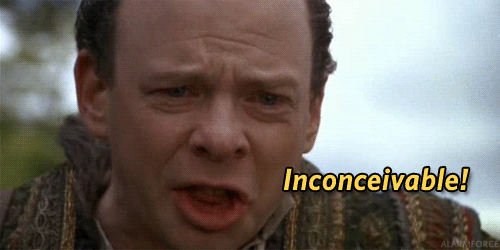
"Well, it's nearly one, and we had best get a few hours' sleep. I dare say you can manage all right on the sofa in front of the fire."
Good of you not to put the man out in the middle of a storm at 1 am, Holmes. Still a bit weird for a police officer to be sleeping on your sofa. Is there no guest room? I guess, now that Watson's moved back in in his widower years, he's staying in it again. And it would be cruel to wake Mrs Hudson up at this time of morning.
It seems we must wait until next time to learn the secrets of Professor Coram's household.
24 notes
·
View notes
Note
I wanna say that I absolutely love your post apocalypse ranchers au. Theoretically I love post apocalypse stories, but most ones end up just being 'everyone sucks and is terrible to each other all the time' which i hate. But yours just has all the community and inherent goodness of people that I really wish was in more post apocalypse media. (I also love the layout, smthn about the little portrait scenes with a few lines' description is a really nice format to me. it's like a blog almost)
idk if this is coherent but basically i love the post apocalypse au and I so wish there were other stories like it out there
I apparently had even more thoughts on this than I anticipated even after forcing myself not to talk about most of it, so borderline essay below...
It's much more common in video games but I get what you mean.
Honestly I think it's an issue of American apocalypse media, and the general intent people go into with the genre. Usually when you're writing a man-made apocalypse story it's to say something about society, and if it's a man-made apocalypse you can generally assume it's not something positive, especially given the sort of person that type of story would attract.
The American aspect I won't get into cause that might be a bit too spicy, but I'll just say if you look at fiction from places with more socialist or collectivist attitudes (that's not specifically influenced by American media or trashy escapist fantasy for edgy teenagers) you find those qualities depicted more. In American apocalypse stories altruism is more of a notably heroic trait for the MC.
(I think the concept of an apocalypse might also just much more terrifying and unknown to North American audiences. Things like relics outside of museums and casually decorating the scenery with ruins is more common in Eurasian media. Ancient history, and the implications thereof, is much more tangible there. I don't think an American version of digimon adventures would ever conceive the digital world as it's presented without drawing attention to it as something tragic and sombre, for example. Probably a whole essay could be written why but this is already too long.)
I think it's also because it doesn't really match well with action and horror genres, which is what apocalypse stories are usually paired with. Apocalypse ranchers is a survival slice or life, and cozy, and the format isn't very conducive to complex action, so there's no need to include it.
In an action story you focus on the action, and physical conflict drives action, and in a horror story the conflict has to scare you, usually involving tragedy. In a survival story the minutia is more important, and in a slice of life the conflict is more mundane. So, I guess that's to say there's more breathing room in RAAU to depict the more realistic daily interactions with people that are ostensibly int he same situation as the ranchers - average people who happened to survive.
I do understand that frustration though. I write a lot of post-apocalypse fiction myself, and this is usually how I would write characters acting simply because that's how I would act, if not out of altruism, then out of practicality.
Um, the restaurant for example. The ranchers are on foot and already overladen with their winter supplies, and they've come to a place that's already established a chain of charity. It's more food than they will need before they're likely to find even more food, and it will be more of a burden to carry it all. In a space that's already established itself as a charitable one people are more likely to return the favour. Think about all those stories you hear about people in fast food drive thrus paying for the person behind them for dozens of cars in a row. Of course there's always gonna be someone who breaks the chain, but that's one person in however many people before them, and it's not necessarily because they're a villain.
(There's also a pretty blatant cottagecore/solarpunk wish fulfillment aspect to the apocalypse fiction I like to write not gonna lie.)
Anyways, I guess that's all to say that you should keep your eye out cause there is other apocalypse fiction out there with that sort of characterization of humanity. Shaun of the Dead, Dr. Stone, and Girls Last Tour come to mind off the top of my head. As far as video games are concerned, lots of survival an apocalypse games, especially open worlds, like minecraft, 7 days to die, no place like home, my time at portia, cattails, plague inc, and niche tend of have a more compassionate setting, even when it looks more bleak and depressing on the surface. They have to for game balance. (multiplayer can't be accounted for, though)
At the end of the day, apocalypse stories really live or die on empathy whether even the creator knows it or not. There's a reason ants so efficiently deal with cordyceps attacks while humans struggle to imagine all of humanity collapsing if it leapt to us, I think. I think where they god wrong is seeing that as a bad thing the characters have to overcome.
67 notes
·
View notes
Note
I think for me it's like - sure, I'd be sad if Lloyd won, because I love Antigone, I wanna talk about her, and I want others to know (or learn!) about her and love her like I do! But there's no real gain to winning a silly Tumblr poll other than a but of happiness. So the fact that the second Antigone pulled ahead everyone immediately went "oh, those shitty Greek mythology fans, they WOULD pull a cheat like this to get ahead, especially after how they've been treating Ninjago fans this week".
Because, like, I'm not gonna say there haven't been some jerk Antigone voters in the notes. But first of all - nearly all the 'mean' Antigone voters in the notes are saying things like "How are we losing to a Lego ninja show??" which, while not kind, isn't exactly worth the demonization to immediately assume we're obsessive shitheads who would get bots together OR SPEND MONEY (what classics tumblr user has money to spend on dumb stuff like this, are they real, how can I live like them, let me know blease) to freak out over a. a Tumblr poll. (I'm not talking abt the people who are saying watching a kid's show makes you immature or uncultured, that's silly and wrong.)
Second of all, for as many mean Antigone voters, there are JUST AS MANY Ninjago fans in the notes going "Wow, vote Lloyd to fuck over Greek mythology fans" (augh Antigone isn't even Greek mythology, stop conflating everything that's old and Greek with mythology. Actually, stop conflating everything that's Greek at all with ancient Greece and mythology, but that's a tangent-), "These pretentious shitheads deserve to lose", "Greek tragedy enjoyers are classist and no one even knows who Antigone is these days, vote Lloyd because they deserve to lose", that kind of thing. Like, nothing TERRIBLE, but it's wild to me the leaps in logic right over their hypocrisy. It's shitty to shit on someone's interests because it's media intended for a younger audience, and it's shitty to shit on someone's interests because its media written a long time ago. But now that thoodleoo and Friday Afternoon are swinging in all these Antigone voters (because surprise, just because a story is over two thousand years old and some of us had to read it in school doesn't mean no one likes it! People have always been people, regardless of their time period, and people have always written stories worth reading that people will care about! It scares me seeing so many of my generation reject classic works out of hand! There's a kneejerk reaction to call something old pretentious, dull, irrelevant, and/or problematic, without actually engaging and understanding why it has been so long-lasting, and it's also scary seeing my generation refuse to understand that they are not inherently better just because they are newer, humans have always been writing beautiful and meaningful works!!! Sorry this was also a tangent!!!!!!) suddenly it's "Wow, with the way Antigone voters have been treating Ninjago fans, it's no wonder they're awful enough to rig a vote."
It's just this - hypocrisy, I think, for me. A lot of these people have come to the conclusion that because they are fans of children's media they are being persecuted, but on Tumblr, that's really not true. Most of active Tumblr watches children's media and cartoons, and that's great! There's a lot of good shows out there for kids that have great stories and messages! But they refuse to see they're doing the exact same thing they're accusing us of doing - rejecting a work and a work's fans because of how they generalize the culture. IE, classics culture has to be petty, pretentious, and shitty. That's what's making me upset. I know we have a bad rep for a reason (behold, the scores of shitty cishet rich white men and what they do with classic asethetics and work, good lord) but the same can be said of shitty kid's cartoon fans (I will not go into that kind of person but you know what I mean). There's always going to be bad people who like good things! But equating all people who like what has been a revolutionary and culturally germane tragedy for two thousand years because it is personally relevant and important to them with snobbish jerks who hate you just because you like cartoons, and then deciding there can't possibly be enough of us to win so we have to be cheating... Ugh. Sorry for the rant in your inbox.
yeahhh i just feel like people are making a lot of assumptions which like. yeah that's what people do. but it's frustrating, and also honestly if you reject ancient literature out of hand you might miss out on stuff you'd like! which i mean is also true of just about any media, like i'm not really into kids' shows but also if i mocked and refused to watch any kids' show i would be worse off for it.
there definitely are some antigone voters being genuinely nasty (and particularly in the replies to the poll there are a couple people who really feel the need to belittle people) but i also feel like i've seen pretty nasty stuff from both sides and it's just like... well it would be nice if it weren't like that! And Also most of what i've seen has been pretty lighthearted/all in good fun. so i don't really get the point of acting like either side is 1. a monolith and 2. universally acting in bad faith
i do think it would be silly for antigone to lose in round three of a poll about who's the most tragic character but it's not that big a deal 😭 and also yeah like. who's paying for this. i'm a phd student and i have to pay rent i am not out here buying tumblr votes
14 notes
·
View notes
Text
I, much like a lot of other queer people I've talked to, have a complicated relationship with queer monsters and queer villains.
Of course the fact that these kinds of characters often imply we aren't human or tie bisexuality to amorality or asexuality to emotionlessness is a huge problem.
And simply making a clean cut and saying:" I want actual human people who are the heroes and who are happy and I want nothing to do with this stuff" is in my opinion a valid response.
But to me and a lot of others there is something appealing about queer monsters.
There's a reason so many queer people love the Disney villains most of who'm are arguably queercoded.
There is something appealing about going fuck it guess I'm the villain now. Because of course the rejection of sociatal norms in favor of doing whatever you want is appealing not only to queer people but just in general. A lot of Villains are fun. Especially the queer coded ones. They're funny , they're dramatic and they don't give a fuck.
Every queer theatre kid I've encountered throughout my years of drama club has had a bit of a thing for villains or at the very least morally grey characters.
And then there's the monsters. Monsters are almost always metaphors for a bunch of stuff that can be read in a lot of different ways.
Be it vampires or fairies or ghosts or aliens or haunted porcelain dolls or ancient forest gods.
There's almost always a queer metaphor if you look hard enough. And I assure you a lot of us are looking.
Monsters are monsters because they are different.
Rejecting humanity in favor of being who you are is appealing especially when those two feel like they can't coexist.
Monsters are gender. Especially to a lot of non binary people.
Monsters are relatable to a lot neurodivergent people
Monsters also often hold within themselves a different metaphor. One for mental illness.
This is were this gets complicated for me.
Because I am all of these things. I'm a queer neurodivergent person with a vast array of mental health issues.
And the thing is...
The Villains loose and monsters aren't human.
Both of these types of characters are often intertwined tightly with tragedy. Especially the metaphors for mental illness.
And if you consume to much of this content you'll start to feel like you are destined to loose too. Like you are fundamentally broken in the same way these characters are framed to be.
It's often more of a subconcious than a concious thing. At least for me it was.
I think the best solution to this particular problem is, except for the obvious: actual human protagonists who are queer and or neurodivergent , is more happy monsters who are maybe even allowed allowed to also be explicitly queer and or neurodivergent.
Both "Hello From the Hallowoods" and "Monstrous Agonies" two relatively new fiction podcasts do the simultaneous metaphor and actual representation really well in my opinion. They both feel like incredibly well thought out deconstructions of the queer monster trope. They both feature a lot of non human characters who are often both metaphorically and textually queer/neurodivergent etc without those two taking away from each other.
You might be asking: why keep the monster at all if the identities they're often a metaphor for are actually represented?
For me the answer to that is: Monsters leave room for interpretation which is good. Explicit representation doesn't and it's not supposed to which is also good.
#nonbinary#queer#monsters#aliens#non human characters#thoughts on media#horror#fiction podcasts#hfthw#monstrous agonies#queer villains#disney villains#queer subtext
154 notes
·
View notes
Note
I keep going back and forth in my mind on whether or not they should keep the story a tradegy and what they will do. What my mind keeps coming back to is the quote "all the great stories return to their original form". Which makes me think that they'll keep it a tragic story. But then I think about how the reason it is tragic is because Morpheus doesn't see himself as capable of change. So what better way to prove him wrong than the idea that stories can grow and change?
Idk what they'll do. I'm sure it'll be amazing either way.
i mean this story is absolutely full of unreliable narrators, the returning to their original form is a dream quote, which says a lot about him as a person, not necessarily anything about neil gaiman
but yeah, i mean. i like well written tragedies, because well written tragedies are one of the best devices for a story about hope, and i think that's what this is
one of the reasons i love hadestown as a story is it specifically calls this out and gets meta with it, but in any tragedy - it's about catharsis, you know?
there's something important in that rock bottom moment, and in experiencing that as a collective. catharsis is an ancient greek word, from the origin of theatre, we're talking plays, things that were experienced by a large audience. ancient greek plays actually used to be short so you could watch a whole bunch of them in a row during festivals to dionysus, it was a whole big Thing
it comes from the word meaning cleansing, and the ancient greeks believed there was something important to that, to watching something terrible happen in a safe space, where it's not real, where you know the actors are fine, and where hundreds of other people are crying with you - you feel for these characters and that sadness is a great emotional release
and i think that's true, it's certainly something i feel with well written tragedies. but i don't think that's all there is to it
there's an instinct shared by absolutely everybody who watches tragedies, something i honestly think is incredible but somehow is universal, and that's that gut feeling that hooks you and goes no this has to turn out right this time
look at what's happening just on this blog today, i'm getting so many responses of people going no, we get another shot, he has to make it this time, this has to be okay, because this isn't right
and i'm serious about not knowing which way this'll fall and being fine with either way, i've just ended up being the tragedy advocate today because everyone else is doing the above and i like it both ways
but it's that instinct that's important. because it's not just something that happens when you don't know the ending. you could have a tragedy in a movie that you have on dvd, and you've watched it 50 times over or more, to the point where you could quote every line. and there will still be that part of you going maybe this time. maybe this time it'll work
stories with happy endings can certainly be inspiring, to the right person, at the right time. but when you're in a really tough spot there's no guarantee your life will turn out like the character's. maybe you don't get as lucky, maybe you get the worst case scenario, and then what? it's hard to fight that on your own
but a tragedy takes you to that worst case scenario. it tells you this is a situation where there is absolutely no way out. and even if you believed there was no way out already, suddenly you find that part of yourself going wait, no, there was a way out, why didn't you take it? if you just had another chance, you'd take it. this wouldn't play out the same way. and if it did, i'd try again. i'd try as many times as i'm willing to watch this story, because i'm never going to accept that this was inevitable
tragedies force the audience to confront that in their darkest moments, they will still fight for things to be better, even when they know everything is lost. and i think in a story about depression, that's really important
(and yeah, the theme of sandman is to keep living you have to keep changing, and to keep changing you have to keep living. but there are so many other characters in this story who embody that, who are there to set an example when an example is needed. look at how popular hob's gotten just from half an episode appearance. and yeah that's partially for shippy reasons, but also he's one of the biggest carriers of the hopeful message, and people have gotten that loud and clear)
so like. if they change it, which will probably end up being along the lines of the retirement au some of the fandom have got going on, i'm absolutely down for that, and i think it will still be a beautiful and meaningful story
and i'm not arguing with all the people going no, we get a retry, we have to fix this, because it's important that they're doing that! that's the whole point! but the fact that they are also means this story's done its job
#hi you've activated the theatre major in me#sandman comic spoilers#the sandman#dream of the endless#hob gadling#mine#meta#ask
38 notes
·
View notes
Text
Quick and rather entertaining/interesting little chat with Gale:
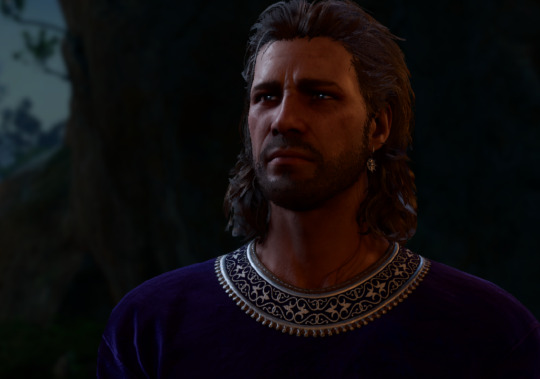
"Even in such fraught times as these, there is peace to be found in the stillness as evening draws in. I used to while away many hours just like these with my companion - though in far comfier surrounds. She preferred it when we were alone, curled up before a crackling hearth with some ancient, esoteric tome between us, ink glinting in the firelight..."
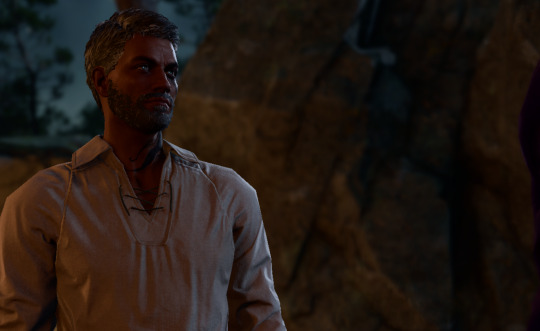
"Are...are you talking about your *cat*?"
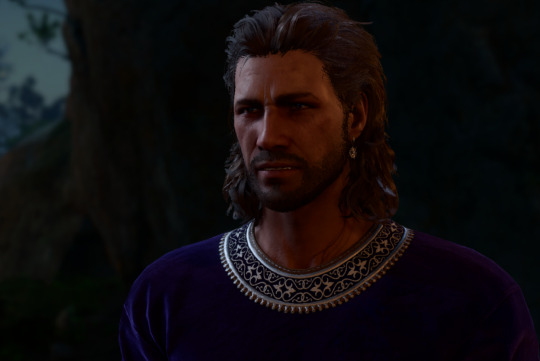
"By Ahghairon's lost nose - no! Tara is not any cat. She's a tressym. And given your confusion, I'm guessing you've never met one. They're brilliant creatures - fine company for any self-respecting wizard. She'd be proud to see me keeping such fine company, the saviour of those poor tieflings no less. And I've given her precious little to be proud of recently.
After I was afflicted with my condition, I locked myself in my tower for an entire year. I was inconsolable, wallowing in my self-inflicted tragedy. I'd given up on myself, but Tara never did. It was her encouragement, her research that led to my treatment. Once we knew that magically-infused items were the key, she went out to find them for me. She saved my life.
She has a good heart, and she would recognize the same in your actions here. I'm sure she'd approve of me lending myself to your efforts."
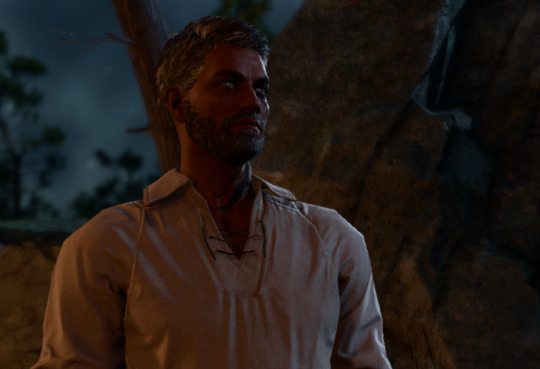
"She must be very smart, to have done all that."
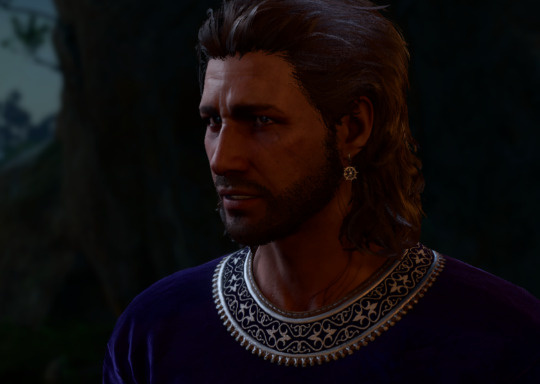
"Smart does her a disservice. She's a fine wizard in her own right, though somewhat held back by her lack of opposable thumbs. You remind me of her somewhat. There's a steeliness to you, an unwavering tenacity even in the face of, to be frank, quite dire odds. I wish she were here for me to make a formal introduction, but I would never ask her to undertake such a journey. She is safer at home. Besides, she was always telling me I needed to spread my wings, so to speak. Find mortal friends, instead of hanging onto Mystra's coattails. So that's what I'm doing. I hope."

"What if she doesn't like me?"
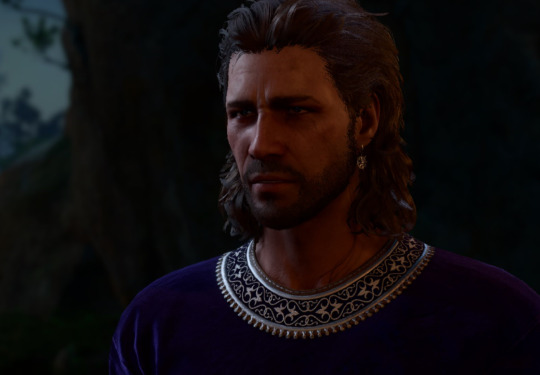
"She'll love you - so long as you don't rub her belly. She *hates* it when anyone does that."
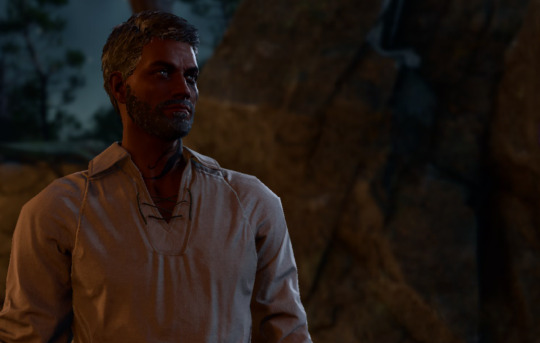
(A/N: One of the options here is "Do you like having your belly rubbed?" which is a) apparently treated as an open romantic overture and b) hilarious.)
"She sounds great. But I was hoping I meant more to you than an animal companion..."

"I assure you, were you to meet Tara, you would see the comparison for the flattery it is. But perhaps that's not a point worth laboring further. Suffice it to say - I think rather a lot of you. And there aren't many on this plane who I'd give such high praise."
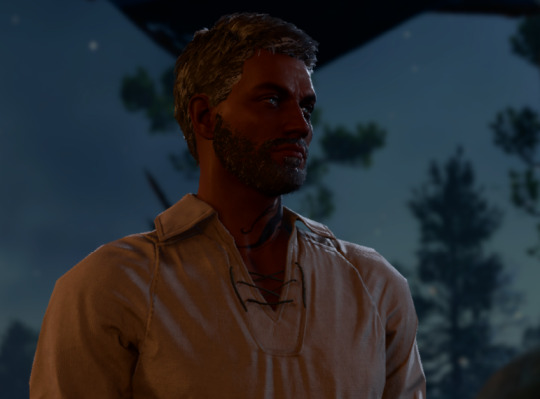
"I'm flattered. Is your good opinion so hard to come by?"

"One doesn't become the most powerful archmage in Waterdeep *and* lover to the goddess of magic herself by having low standards. I assure you, when I tell someone they're wonderful, I mean it. And you...are wonderful."
Gale's tone here is really interesting. Their conversations since the party have been tinged with flirtation, and with this it becomes quite clear that whatever Hector feels, Gale...is definitely falling for him. A bit unfortunate for Gale, given the current state of play. I think if Karlach hadn't come along, this would have proceeded to something deeper.
Honestly, I think Gale and Hector are a bit too similar. They're both private people, both cautious, insular, and simultaneously brilliant academically and awkward as hell socially. Both of them would do best with someone to draw them out of their shell, rather than encourage them to further introspection.
But...Hector can feel the pull there, nevertheless. And he's treading around it carefully, because he values the man's friendship deeply already and isn't at all sure what to do with all the other feelings.

"The feeling's mutual. You're a wonderful friend. Though usually more...erudite."
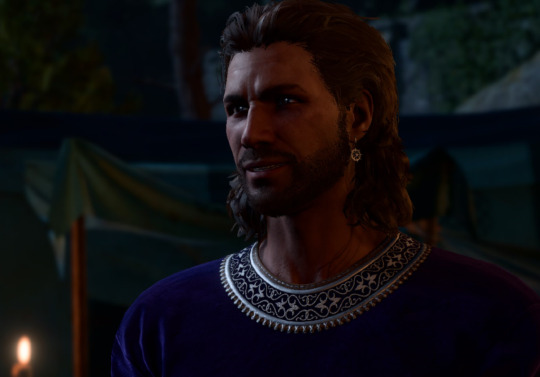
"Wine is to wit as meat is to... to... oh, I can't bloody remember it. There I go, then, proving your point. Perhaps we'd better leave it at that. My ineloquent tongue isn't worthy of your ear at present. Go - enjoy your evening. Nothing better for the heart than a good night's rest. And mine is gladdened to know I'll have the pleasure of your company again come morning."
#bjk plays baldur's gate 3#hector carlisle#poor gale#he's trying his best and honestly not doing a bad job#wrong place at the wrong time
6 notes
·
View notes
Text
Let's go up the giant beanstalk (2)

I said before that “Jack and the Beanstalk” and “Jack the Giant-Killer” are two different tales that should not be confused with each other – but it does not mean they are not related… Indeed the link between those sibling-stories goes beyond simply sharing a giant-opposing Jack. There is a running tradition in Jack adaptations and pantomimes to name the giant “Blunderbore” – which is actually one of the giants of “Jack the Giant-Killer” – and while this seems to have no root in any of the published texts above… the first printed version of the tale, the “Jack Spriggins” parody, did name the giant using a character from “Jack the Giant-Killer”. Though it was not “Blunderbore” – the Jack Spriggins tale rather names the giant “Gogmagog”.
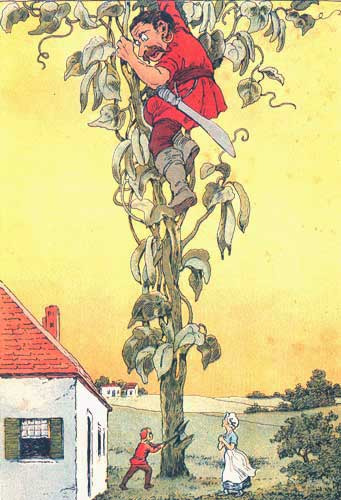
If things were not confusing enough, the giant of “Jack and the beanstalk” is known for his iconic line, “Fee-fi-fo-fum, I smell the bones of an Englishman.” (It is the Jacobs’ version of the rhyme, which continues, with other rhymes saying how the giant will grind Jack’s bones to make his bread). Well, this line is ALSO present within “Jack the Giant-Killer”, but rather sung by a giant named Thunderdell. “Fee, fau, fum (or alternatively “Fe, fi, fo, fum”) / I smell the blood of an English man” – again, continued by rhymes evoking a bread made out of human bones. This line, “Fee, fi, fo, fum”, has in itself a fascinating history because, as with many British fairytales, we can find an old manifestation of it… within Shakespeare’s plays. More precisely, in Shakespeare’s famous tragedy “King Lear”, we find the lines “Fie, foh and fum / I smell the blood of a British man”. This line comes from the very end of the fourth scene of Act III, where the character of Edgar pretends to be a madman by the name of Tom, and thus speaks in mysterious references and nonsensical riddles, and when he quotes this line, he does not do it in reference to any Jack tale… But rather by mixing it to the famous British story of “Childe Rowland”. The actual quote by Edgar/Tom is “Childe Roland to the dark tower came. / His word was still ‘Fie, foh and fum, / I smell the blood of a British man’.” It is very likely to be a comical mix-up of various folktales together, since the line is not traditionally linked to the Childe Roland tale – but it is extremely interesting, because it explains the first word of the seemingly nonsensical rhyme. Indeed, the “Fe/Fee” of later Jack tales is here a “Fie”, aka the archaic onomatopoeia of disapproval, and one that Shakespeare loved to use. As such, it is possible that the original first word of the rhyme was a “fie”…
Mind you, there is an even older record of the line: it first appears in 1596, under the pen of Thomas Nashe, in his pamphlet “Haue with you to Saffron-Walden” (it was part of a series of attacks he wrote against the writer Gabriel Harvey). It is where the line first appears, under the shape of “Fy, fa and fum, / I smell the blood of an Englishman”, but within the same pamphlet, the rhyme is described as being very old, so old in fact its origin has been lost to time…
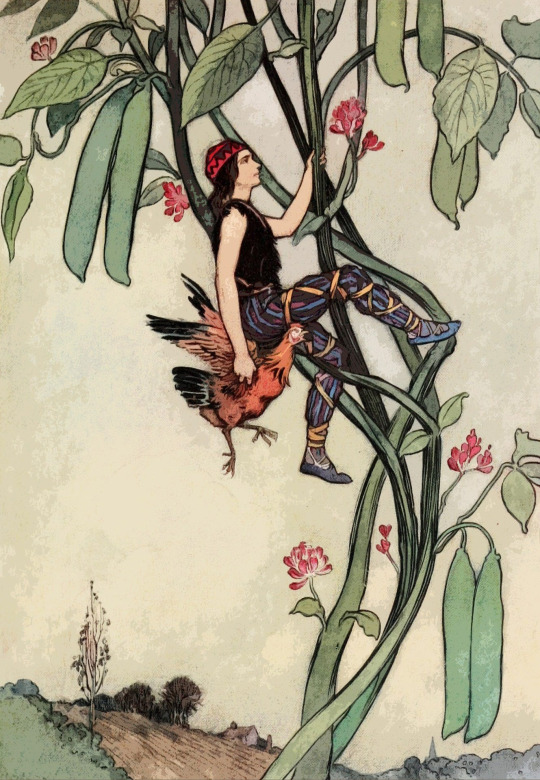
There is a lot to say about “Jack and the Beanstalk”, but for now I will highlight a final element that participates in weaving this tale in the tapestry of British folklore: the goose. In the version we all know and share, Jack steals three things from the giant. Money, a magical harp that plays on its own, and a goose that lays eggs made of gold. The goose with golden eggs actually dates back to one of the oldest collections of fables we have: Aesop’s fables written in Ancient Greece, by the seventh or sixth century BCE. One of those fables is titled “The Goose that Laid the Golden Eggs”. In France, it was re-popularized by Jean de La Fontaine’s own collection of fables, which had a modernized version of the story, “La poule aux oeufs d’or”, “The hen with gold-eggs”. But it is from Aesop’s fable that came the European symbol of the “goose with golden eggs”, and various sayings and proverbs such as “Do not kill the goose that lays the golden egg”, which itself was then recut and reshaped into various other proverbs (such as “killing the goose” for a self-destructive action). If you do not know, the fable always end up the same way, though the reasons behind differ – the owner(s) of the goose that lays golden eggs end up killing it due to their greed and desire to have more gold, thus destroying the very source of money they relied upon.
But where the “golden-egged goose” link becomes interesting is within the domain of nursery rhymes. I made a LONG time ago a series of posts about “Mother Goose” (they were in fact my very first posts on this blog). Long story short, Mother Goose did not exist in England until the second half of the 18th century. Indeed, she became known to the English world thanks to the translations in English of Charles Perrault’s fairy tale collections “Les contes de ma Mère l’Oye”, “The tales of my Mother Goose”, in the early 18th century. But from the mid 18th century onwards, publishers of nursery rhymes and other children-aimed books started using “Mother Goose” as a sort of mascot, recurring figure or title-cliché, in reference to Charles Perrault’s fairytale book. As such, soon Mother Goose started becoming a British “emblem” or “symbol” of nursery rhymes as a whole, seen as “Mother Goose’s rhymes”. England invented an entire character based on this single name – and by the early 19th century, she even got her own nursery rhyme/pantomimes (the two were always closely linked and I do not have enough expertise to go into the details). The “rhyme” of Mother Goose was not notably known under the title… “Mother Goose, or the Golden Egg”/ “Old Mother Goose and the Golden Egg”. Because to the character of Mother Goose, “mascot” of fairy tales and nursery rhymes, was added the fable of the Goose that Laid Golden Eggs… And in the nursery rhyme and the pantomimes, who is the third character that makes the link between the mother and the egg-layer? Mother Goose’s son… Jack. Yes, another Jack linked to a mother figure and who ends up with a goose laying golden-eggs – though no giant appears in this version, as this Jack is rather inspired by the various Jacks of nursery rhymes (or so I heard, again, I am no expert on the topic).
As you can see, from one simple story we enter a maze of references, links and cultural inter-weaving tying together a lot of various domains…
#jack and the beanstalk#jack tales#jack the giant-killer#shakespeare#fairytales in shakespeare#british fairytales#english fairy tales#the goose that laid golden eggs#the goose with golden eggs#fables#giants#childe roland#childe rowland#mother goose#nursery rhymes
4 notes
·
View notes
Text
I finished BG3 for the second time last night, and I have many spoilery thoughts about it (including PICTURES) so I'll put them under a cut. BG3 spoilers ahead, be warned!
I enjoyed the ending a lot more than my first playthrough (even Karlach notwithstanding, since this was the first time getting her sick Avernus ending). My first time I felt a little left out to dry by how it felt cut-off with no epilogue, but now that I saw that coming I enjoyed it more for what it was, if that makes sense! Though epilogues would still be nice, especially if there the same level of quality as Karlach's Avernus ending (but honestly I'd be fine with a slideshow too)
I have also made my peace with Ruathym becoming a Mindflayer. I don't think he wanted to do it per say, but I do think it suits him, and I'm cautiously optimistic in believing the game on him being an unprecedented mindflayer who may still retain himself and his soul. Plus it adds a really tasty tragic twist to his character, especially being in a romance with Lae'zel. Both Zephyr and Ruathym's romances have the potential for tragedy, but Gale's is seen ahead of time by the characters in the story, making it more satisfying to fight against it, while there's no way any of the characters could anticipate Ruathym having to become a mindflayer to free the prince of his lover and save the world, so it's more satisfying to lean into that dramatic irony. Plus, like, he lived in the Underdark anyway, and I don't think animals would shy away from him? So he'll be okay in the long run, I think. (Copium? Undoubtedly.)
I would really like to see like epilogue slides for the characters. If I wasn't romancing Gale I'd have no idea his plan was to go back to Waterdeep, and I had to look this up but if you romance Halsin he tells you he's going to start an orphanage! Why is that romance-exclusive information?? And like Shadowheart and Astarion are left out to DRY, people have already mentioned it before but there's no way the party would just let Astarion run off like that without following him. And if you let Shadowheart's parents die, there is zero follow up on what her plans are after all this. So idk, I know Larian said they're working on the ending, and I'm looking forward to it.
I would enjoy the ending much much more though if it actually worked. Like, I had to reset the game multiple times bc it just refused to render
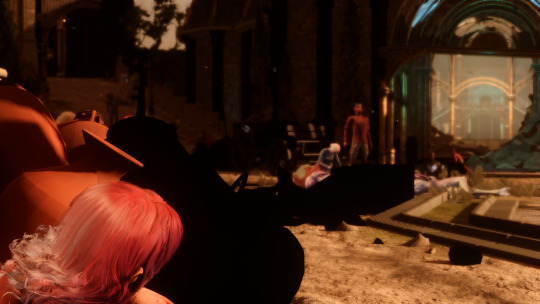
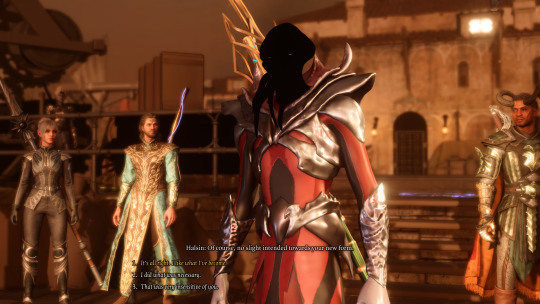
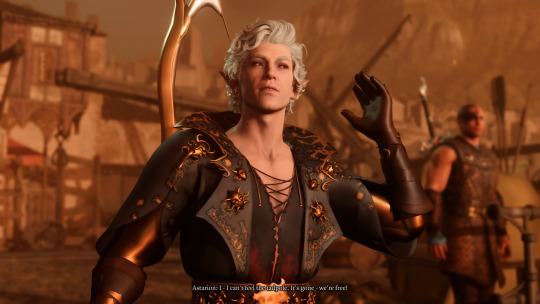
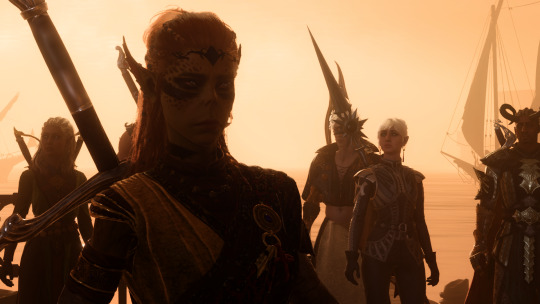

Like idk I know it's a big game and my PC isn't the newest, but it's not ancient either and some people are playing this on their laptop for crying out loud!! I shouldn't be dealing with this level of graphical issues. (The same issues were cropping up during Gortash's coronation btw, which is what made pics for my mod such a pain to get). And while I do mod my game, I can't believe the mods I have are enough to cause this 😭
So, that kinda put a damper on things, but the *content* of the ending, I mostly like! It does feel very epic, and I appreciate that it was challenging but not impossibly difficult. It's also very satisfying to see everyone again, almost teared up when Rolan and Barcus Wroot gave their support to me! They were just That One Grumpy Tiefling At The Grove and That One Gnome We Saved From A Windmill, and look at them now!! ahhh that was really good.
And while I think it still needs to be extended, I do actually like the immediate nature of the goodbyes. Wyll and Karlach have to go to Avernus now, Astarion needs to get out of the sun now, and Lae'zel needs to leave for her people, and Ruathym is a Mindflayer now. It gives the ending an appropriately bittersweet note. We won, but we still lost people, even if we may see them again. It all happens so fast because the tadpoles died like *snap* that.
I loved this game, and I like this ending. I'm going to make myself wait before I replay it (bc this one of those games I want to be playing all the time), and when I do I want to see if I can squeeze one more oc or one more romance in there. I don't really do AUs, which include other playthroughs with different protags, and I'm not a huge fan of having a pc for every romance option, but I think between the options that are free (Halsin, Shadowheart, Wyll, Karlach, Astarion,....Minthara(?)) somebody could pair up! Even if it's after the events of the game lol. So I'm kinda tossing around the idea of a Wyll origin playthrough and finding who he'd romance, but idk yet, we'll see 👀
#baldur's gate 3 spoilers#bg3 spoilers#like no really SPOILERS#baldur's gate 3#bg3#thought dump#marie speaks
6 notes
·
View notes
Text
Mahō Tsukai no Yome/ The Ancient Magus Bride: When an anime show witchcraft in the good way.
I will slide a little of my usual crap for this time.
“The humanity still remembers the sounds that filled their bodies even before than language. The Magic is the same. Listen what’s around you and extend your hand, you still remember…”
Besides being a witch, I’m also pretty much a mild otaku (I take baths, I swear), so when I was looking for what else to watch, I stumble with this one. The resume I read looked not too good for my taste, but I thought “Well, it have a witch theme, let’s give it a try” and OH BOY WHY IN THE WITCH COMMUNITY THEY DON’T MENTION THIS SERIE AS A MUST TO WATCH?
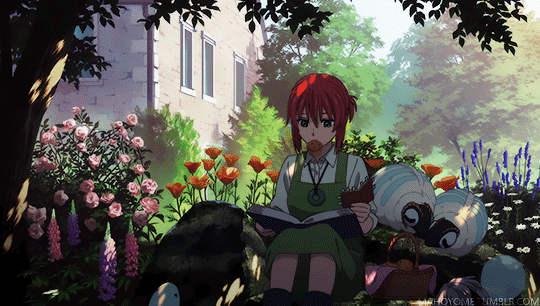
I will not enter in details about how the characters are made or the music (even when I will mention that the art is visually BEAUTIFUL and the songs will make you cry a dozen times, because yes, you will cry a ton) and I will focus this review with the witch side.
First, I can tell you that a good percentage of the magical lore is pretty ACCURATE. From creatures, myths, material, ingredients, techniques, all. IS WAY TOO ACCURATE, it let me think that the writer has a witch near to learn about these shits. It doesn’t fall into the “lol I can make magic haha let’s open a portal and will have no logical reason and I will not even get tired”, is a “witchcraft is a craft and you need to study, practice and follow some principles, plus rest after do it”. Fuck hell, a lot of times is teaching us to not underestimate ourself and learn, but also to not do stupid things if you don’t know a shit. Plus each chapter start with a “folk proverb”, which add a pretty touch to the theme.
It mentions fairies, with her “real” rules we usually know. It teaches us to differentiate between witchcraft and mages, speaks about the ancient lore of England, Celtic culture and even Nordic songs (maybe? Is nothing official but have Nordic words and Gaelic music so lol?), the Wandering Jew, alchemy, yule, herbs, Morrigan, the church grim, hag stones, fluorite, types of wood, wyverns, familiars, wands, crystals, charging, witches, covens, crafting, fatuos, sacrifices, selkies, elves … Damn, even in some point she makes a spell against nightmares with lavender, like YES!!.
The characters speak also a lot of the witch “spirit”, you know, the respect for the naturel, the elements, the way we use magic, all the spiritual thing that cross us, the interconnectivity of the world, in such delicate and beautiful way that make you re watch your own witchy path with fresh eyes. The majority of the teachings that the “wiser” characters say, seems not even to being directed to the protagonist, but to OURSELVES. They are teaching US.
“Underestimating oneself, as if you were disposable, is like saying that those one has saved are useless”
In some point a fairy mention to a priest that he adores “another god” as if all the deities of the world exist at the same time, you know, as we all know here!
Elias, the character, is by himself a mix of stuffs! He usually wear a veil to not scare others but, we know to what else a mage would use a veil, right? He also carries a cane that bears a resemblance with the Egyptian Was scepter. His face is very similar to what we know as the “goat face” or the head of Baphomet.
And anyone who ever has or have a Patron will probably say that Elias, in some points, remember us about them. By the energy, the mysterious way to speak and act, by the strange love that come from beings that are beyond our comprehension.
Besides all that, the story is phenomenal and touch death in so many artistic ways that is almost a thesis of the process of life and death. Death as a natural path where everyone will fall, death as a tragedy, death as a process, death as a rule, death as a memory, a trauma, a lost, a desire, death as a body, death as a soul.
Not even mention how, in a subtle way, show us about PTSD, suicide and depression, how slowly heal from traumatic events, how grow and take healthy coping mechanisms; how a person under a traumatic past can get numb to the point that everything seems bland and pointless, about codependency, grief, move on. Is a book about psychology and witchcraft with pretty stuffs in the middle.
“You think that by destroying yourself you will earn the right to stay here”
A huge NOPE: It have a hint of Antisemitism. The main bad character is the Wandering Jew, and one of the “good” ones is a German scientist called Adolf Straud. Meanwhile, IRL existed Adolf Strauss, a German general from the Nazis. Like… I’m not saying is the same but… * cringes *
Of course, is not a manual, is an anime, it has a lot of nopes and mixed shit and stuffs that are obviously not accurate or right, but coming from a popular media, I think any witch with some basic experience and an open mind should take a look to this anime. With a small tw because it can fall a little into the gore and horror. But next to the usual Hollywood movies where witchcraft is more a show or the source of the darkness in a scary movie, is pretty good.
6 notes
·
View notes
Text
Loke Talk and Many Many Tangents, Don't Look at Me
Thinking about Magister Jace Loke again. I seem to voice all the Thoughts I have about him and my Godwoken, Arboren, on Twitter of all places. But this is going to be longer because I'm feeling inclined to rambling and can't be bothered to edit myself. Also I'm spewing this on here because I don't want to have to see, in person, anyone roll their eyes or blatantly ignore me as I go on about my nonsense (fair) for the millionth time in a row. For clarity, I'm currently working on one of my many AU ideas in which Loke appears and encounters Arboren. Typically in my head that happens under similar circumstances as they do in game because I am a sucker for the whole 'fate, but in different realities so some things are the same, but some things are changed' trope. Probably because the general inevitability of it can be great grounds for either tragedy, or a certain bittersweet vibe, depending on my mood (I never truly write tragedies. There's enough of that to go around, and they may have their value, but I like my happy endings).
In my flower shop AU Loke works for a private paramilitary organization that is employed by a megalithic, religious corporation (most of them seem to end up that way at their worst, and I'm calling it what it is in this case for clarity) which is scrubbing the world for historic artifacts of magic significance. In the transport of one such magic artifact Loke suffers traumatic brain injury due to a concussive blast which damages optical functions (as it turns out, people rightly take issue with you pilfering historical and cultural artifacts from their homes). While he is in recovery (and waiting a larger surgery which should repair the damage) he misses the funerals of his fellow comrades and when he does finally get the chance to show his respects, he goes to purchase flowers as is customary. It is here he encounters Arboren. Arboren is running a flower shop called Good Intentions (homage to my angsty as all heck fanfic by the same name) and is a refugee in the city (I think I called it Port Joy because I have no shame), escaping from the destruction of his homelands which are being invaded by a terrorist state which unlawfully used chemical warfare in their assault upon said elven homelands. There's other stuff going on, like the fact that Arboren was charged with the care of the flower shop by an eccentric who has decided to retire and go wandering around the world and other places, that there is a shape shifting shop clerk called Q who helps out around the place, and endemic necromancy problem going on in the background etc etc, but that's the main of it as far as I have considered so far.
The AU I am working on right now is a mermaid AU because it's almost May and if you're on the internet at all you probably know that a lot of artists go wild about mermaids in May. Also for personal reasons I am spiritually bound to love ocean related things. I've officially called it Good Intentions: Sword and Scale. And I say officially because I've gone off the deep end (heh) and started to draw it as a SHORT comic. I'm hoping to being posting in what I am startled and alarmed to find is only 40 days. I'll probably go into more detail about the plan for that as the time approaches (its not a big deal or as serious as I make it sound, its literally just a fan comic, I'm just nervous and excited and get even more verbose than usual when I am). Loke finds himself aboard a vessel, returning home as a member of an army which has concluded a crusade and is laden down with all sorts of spoils of war, including a particularly rare and powerful gemstone (I imagine you can see the through line here). Unfortunately, what none aboard the ship are aware is that the stone was kept on land for a reason, and by bringing it out to open waters once again they unwittingly awaken an ancient sea creature. I won't go into too much detail, since I want to save that for the comic (lower your expectations--I'm working very hard to keep this comic thing Short. Literally, my goal is for it to be done by the time May ends), but the plot is pretty basic: mermaid encounters victim of ship wreck and decides to be nosey.
I've gone on a mega ramble here, given that my original intention was to say that I was reviewing Loke's dialogue (thank you awonderfulaverage) and it got me thinking about the Thing With Loke. The thing with Loke is actually a lot of things and I won't even guarantee that I'm going to be concise, or wholly accurate (my brain refuses to differentiate between canon and fan fiction and also just that one errant thought you had while standing in line at the grocery store or something idk).
First of all its the way he literally trips into your arms, and then stands there, apparently taking comfort in the contact and then asks you for reassurance (even if there isn't really any to give) about his injury. DESPITE THE FACT THAT HE HAS POTENTIALLY ALREADY OUTED YOU AS BOTH A LIAR AND A SOURCERER AND AN ESCAPEE (fun fact: Arboren is actually my second play through. I created him in case my sibling wanted to play with me and then I got Attached. In my first play through I was playing Remry, an Undead pirate who lied through his teeth and sent Loke back to the Fort. Never finished that run. Didn't even get off the island. Blame Arboren.) I think the vulnerability of that really struck me. Also it made me decide that Loke's love language is probably physical touch. And when I talk about love language I really do mean more than just romantically. In my head love languages are ways of fostering/showing/whatever emotional connection between other people (hey, I've done negligible research into this and have basically only heard of love languages through other people and also internet quizzes which notoriously don't mean much). I think that in his most vulnerable and terrified the fact that Loke tried to absorb reassurance through the touch of someone else who, as far as he is aware and believes, is a dangerous element says a lot about him. And because of everything that has been done to the elves, and their community and how much has been taken from them, its really no wonder in my head that for all his righteous indignation towards a Magister, Arboren (elven godwoken) would immediately feel something towards this person. I won't say romance because I love me a slow burn and can't really wrap my head around love at first sight (attraction maybe I guess depending on who you are and how that works for you). But I think Arboren is someone who is seeking to fill the hole left by the way his community has been so horrifically and violently ripped away from him (something which is true in the flower shop AU too, but not in the mermaid one, so we will see a more lighthearted Arboren with more space for kindness that he doesn't question in himself). But at least a sort of softness, a sort of immediate desire to reciprocate that connection. And even though in this play through I could hardly see Arboren just handing himself over to get cuffed again (regardless of how that would have ended), I felt absolutely sure that the encounter had a lasting emotional impact on him (he just walks away from Loke, leaving him alone in the undergrowth... I sent the character with the highest speech back alone and did convince Loke to go home though). Hence the fan fiction where I force them to keep meeting because hrng its just so good (yay, I have an idea for a fourth encounter, off of Reapers Eye-I'm just saying, what if Loke decided to help Paladin Cork, and then they were 'politely' sent off the island for sticking their noses where they don't belong. Canonically the PC can run into Cork again. I think it'd work. Actually this is kind of the premise of the drawing I did with the flowers. If anyone knows what I'm talking about. I just want Arboren and Loke to sit by the riverside and chat and you know. Sunshine and willow trees and quiet and relative normalcy. I think it's a good story beat in the over arching narrative of Terror and Bad).
The other thing (no, I'm not done yet and maybe I never will be) is how the whole "I'll never forget you" thing goes. Like. Honestly. They could have just said "I'll never forget this" at each other or something. Because, inherently, it's the situation you'd think was the most significant, what with the horrible undead being violent and bad and the action of fighting side by side, despite supposedly being enemies. 'I'll never forget this' would have been dramatic enough. But no, what leaves an impression on either of them is the other. "I'll never forget you. And if I remember correctly, the PC says it first after Loke says "Get out of here. We never met. No one has to know." (As if trying to convince himself. Because he still thinks that by doing this he is doing something wrong, because he still does think the PC is dangerous. Dangerous but maybe not deserving of Fort joy, which he must surely see isn't great. And I don't blame him for his ignorance. Loke reads as just some regular Joe, and was probably pretty young when he joined up, and we all know what propaganda and systematic conditioning can do to people. Like. My dude's in a cult. People go through careful deconditioning when escaping cults. One conversation amidst a newly inflicted, completely fresh, blood still drying injury that has taken away one of his senses and the loss of a bunch of people he knew isn't going to undo that, no way, no how). But then Loke reciprocates. And I think that is important. It might seem on the surface rather obvious that the PC will remember the one Magister who lets them go (there might be others but Loke obliterated them from my mind). However I think it says a lot that Loke returns that. Well. If I'd gone against a law and committed a crime by letting a wanted felon go I'd probably remember that too, but I wouldn't necessarily say it back to them. Reciprocating a sentiment out loud, back to a person, takes a different level of emotion I think. And it didn't read as a "wow, yeah, this has been terrible, let's never do this again because it sucked' kind of "I'll never forget you". It felt very sincere. Like Loke was honestly going to dwell on this moment, and it was probably going to be quite pivotal in how he approaches things from here on out.
I don't know what the future might look like for him. In my head the tide carries him into Arboren's path once more, but it's hardly as if every player has such ridiculously intense thoughts on this random NPC. And I don't think it's true that this is how things go down for every encounter of him, regardless of what form and history the PC takes. This is just the brain spew that's been building up in my head that needed somewhere to go. In summary: Loke seeks connection in dark moments and my boy Arboren does the same. They actively share a certain level of vulnerability with each other in an unideal circumstance and it gave me the brain rot. If you made it this far: How? Why? I'm sorry?
EDIT: Spelling because why.
#you don't need to read this#I've just gone a little unhinged is all#Loke#Magister Loke#Jace Loke#my fan fiction is Good Intentions on ff.net if you want#maybe I should post it on here#I dunno#rt out here dumping entire brain on a post and then tossing it at you irreverent of consequences
4 notes
·
View notes